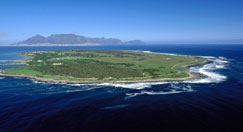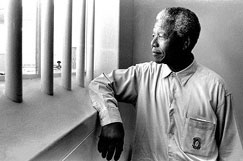Robben Island revisited digitally
Cadine Pillay
2 April 2013
A multimedia project, Mandela 27, will bring the tales of Robben Island to life digitally
as part of a new international campaign.
Mandela 27 aims to highlight the social events that influenced change in South Africa
and Europe during the former South African president's 27 years in prison.
It was launched at Cape Town's gateway to Robben Island last month, and will draw on cultural links between South Africa and Europe during the apartheid era. It is estimated it will cost about R5-million (US$539 000); part of the funding will come
from the European Union.
Mandela 27 partners are the Robben Island Museum, Britain's Coventry University,
the European Union's Cultural Programme, Belgium's Creative Stories project, and
Elderberry, a content developer.
Mandela's travelling prison cell
Most of the stories will be told through an interactive website with a map interlinking
events of activism in South
Africa and Europe.
There will also be a video game that will be used as an educational tool to teach
children about the island and anti-apartheid activists.
Letters, poems and stories from the former political prisoners written between 1960
and 1990 will be exhibited at the Robben Island Museum Gateway at the V&A;
Waterfront and on the island.
There will also be a travelling three-dimensional reconstruction of the prison cell
where Mandela was incarcerated for 18 of his 27 years behind bars.
The game and other digital components will be ready by February 2014, while the cell
will start travelling in May 2014.
Thousands of tourists visit Mandela's former cell on Robben Island, a UN world
heritage site almost 10km from the mainland.
The replica of the cell will be a low-budget affair made of plywood but will feature
information panels and multimedia exhibits. The travelling cell is likely to be displayed
in schools, libraries
and museums.
The video game is described as a serious game in the style of a graphic novel, and
not purely for entertainment.
Based on interviews with former prisoners, it features five recurring elements of life in
the remote jail: prisoners were not allowed to see children; they craved physical
activity including football; education was a key pursuit; communications were heavily
censored so that messages had to be smuggled; and hunger strikes were used to
make existence bearable.
It is being developed by South African students with help from the Serious Games
Institute based at Coventry University's technology park in the United Kingdom.
Cultural lesson for born-frees
The initiative comes 19 years after the end of apartheid, as a "born-free" generation
– those young South Africans born into a democratic nation – deals with 21st
Century concerns rather than looking back on its history.
Elderberry's David Powell said
the target audience was 16- to 25-year-olds as the
events took place before they were born. But, he added, players should not expect
to find themselves in the role of Mandela himself as it was more likely that
anonymous characters would be used.
Jacqueline Cawston, the programmes director at the Serious Games Institute, stayed
on Robben Island for three days during her research, and insists the story of the
cultural events has not been told.
"The way that we're telling it will be engaging to an audience that hasn't read
history books and weren't alive at this time," she said.
"The whole point of the project is to get the message out there. This graphic novel
will depict life as it was on Robben Island."
Sibongiseni Mkhize, the museum’s chief executive, added: "This comes at a time
when we are trying to improve the manner of how we tell what happened at Robben
Island."
He said the project was about sharing untold stories of those
imprisoned on the
island for their political activism. It was also a way of creating inter-cultural dialogue
internationally and sharing knowledge. "All those things were political.
"The poems and songs were a way for the political prisoners to get their message
outside," Mkhize said. "We want to tell story of not just Mr Mandela, but the values
which he and other political prisoners shared on Robben Island."
There were plans for a reunion of former prisoners on the island later this year.
Mandela, who is currently in hospital for a recurring lung infection, had not been
consulted about the project but his foundation was aware of it.
First published by MediaClubSouthAfrica.com - get free high-resolution photos and
professional feature articles from Brand South Africa's media service.
 Freedom ... in sight, but a million miles away for Robben Island prisoners (Photo: South African Tourism)
Freedom ... in sight, but a million miles away for Robben Island prisoners (Photo: South African Tourism)
 Veteran photographer Jürgen Schadeberg documented Nelson Mandela's return visit to his Robben Island cell in 1994 (Photo strictly copyright Jürgen Schadeberg)
Veteran photographer Jürgen Schadeberg documented Nelson Mandela's return visit to his Robben Island cell in 1994 (Photo strictly copyright Jürgen Schadeberg)




